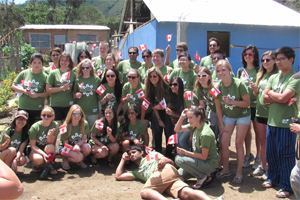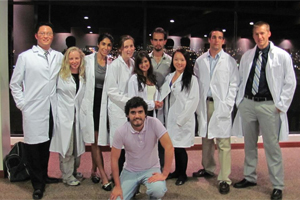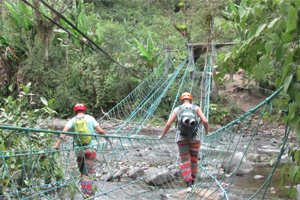Why did you decide to volunteer with Help, Learn, Discover in Ecuador?
Kerry: I’d known for a long time before I went on this trip that I wanted to do international volunteer work at some point in my life. I love travelling and I wanted to be able to see a new place and do some actual good while there. I was concerned about going on a program alone, so I wanted to make sure that I found one I could trust and know that I would be taken care of. After speaking to a friend, who went on the trip the summer before, I was convinced. Also, the Bio-med program (which spends a week in the Galapagos) seemed to be the perfect combination of my interests: medicine, helping others and evolutionary biology.

Describe your day to day activities as a volunteer.
Kerry: This is a difficult question to answer since every day was so different because of the different components of the trip. During the volunteering we would be served breakfast at the hostel and then drive to the volunteer site for around 9:30am. We worked on the houses until around noon when we’d be taken to a restaurant for lunch. The work would continue until dusk, when we would gather with the other workers and have an end of day cheer.
Dinner would be around 7pm back at the hostel and then the nights were spent relaxing. During the medical rotations we would have an early breakfast in the hotel then be picked up by the tutors, who were medical students, to be taken to the hospital our morning rotation either in surgery, emergency, ICU or pediatrics. We were taken to a traditional Ecuadorian restaurant for lunch. Then we would make our way to the medical center for an afternoon rotation either in internal medicine or sports medicine/rehabilitation. We would then have a rotation in either stitching, radiology or CPR training. After dinner we went back to the hospital for our night rotations in either emergency or surgery. The travel component of the trip varied from day to day but was usually packed full of activities like waterfall repelling, hiking, site seeing, tubing and more.

What made this experience unique and special?
Kerry: I think what sets HLD apart from other trips like it are the people who run the program. Everyone is so warm, enthusiastic and caring; from the directors of the program to the group leaders.
It is not merely a money making scheme with the volunteering as a gimmick. Juan and Jose, the two Ecuadorian brothers who started the program, genuinely want to help people in need. They get to know every student on a personal level and make you feel at home all the time. The group leaders were also some of the friendliest people I have ever met. They were able to make any situation, even long bus rides, incredibly fun.

How has this experience impacted your future?
Kerry: This program taught me a lot of things. Although this is cliché, I learned it is important not to say ‘no’ to opportunities. Even if you are nervous you won’t like something, it is important not to say no to opportunities that are presented to you. That is how you experience everything and live each day to the fullest.
This program also made me realize that you don’t have to be a doctor to help people. There are so many ways to help others; all you need is the motivation and the time to give. Lastly, this program made me more sympathetic to the hardships that people face when living in poverty and made me more appreciative of how lucky and privileged I am. It is impossible to appreciate what you have until you see the people who don’t have anything at all.